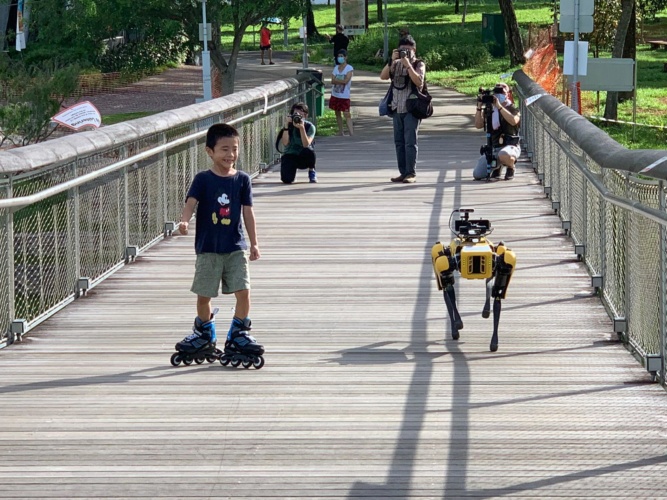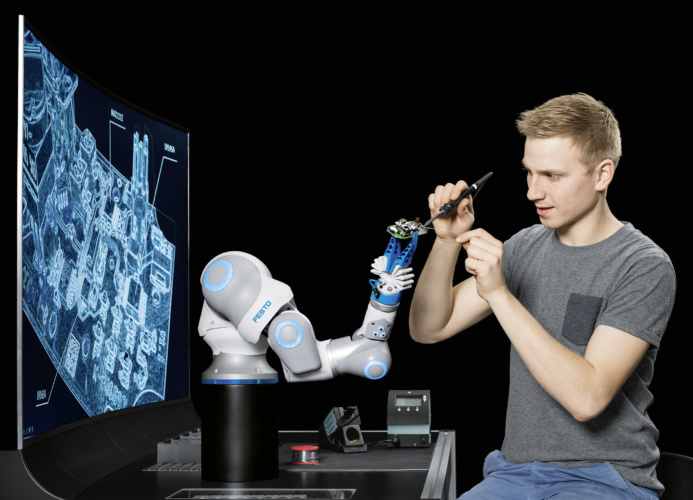The COVID-19 pandemic has seen an unprecedented galvanising of the global scientific and technology community, who are coming together to rapidly develop and deploy innovative technological solutions to address the multi-faceted challenges posed by the current health crisis.
As a result, what we are seeing now are compelling examples of specific tasks that robots are able to perform effectively today, including individual robots being used to disinfect spaces, transport medical supplies and food around hospitals, and so on. We’ve even seen the use of walking robots during this pandemic, as shown in the recent video footage of a robotic dog encouraging social distancing in a park in Singapore. These applications are helping us to explore what robotics could do – and should do – in the future to address crises of this magnitude.

Robotics and autonomous systems today have an incredibly important role to play across many sectors including, crucially, in resilience and how we can prepare for and cope with unexpected events. A key challenge for the future – and a major focus of current research – is the ability to build adaptable, multi-task robotics, not just robots capable of fulfilling a single task. The capability to quickly change and adapt robotics systems to efficiently carry out new roles will form an increasingly vital part of our response to major crises – for example, quickly re-deploying robots designed for tasks such as cleaning and repairing roads for pandemic mitigation strategies such as search-and-rescue, disinfection of public spaces, and removing viral risk from the environment. Once we have the fundamental ecosystem in place, we can change how these technologies work for us, delivering robots that have multiple functions and re-use capabilities. The effective deployment of robotics technologies during the COVID-19 pandemic is teaching us what is possible and will undoubtedly accelerate robotics innovation and development.
Robots today are very effectively working in hazardous environments, taking humans out of high-risk scenarios, and we would expect the use of robots in this key area to increase. In the manufacturing sector, industrial tasks often require two or more people – making social distancing challenging – so it is likely that co-robots will have a crucial role to play here, either through the ability to work alongside a “robot buddy” or by fully automating key tasks (using two robots instead).

Similarly, in factories and on production lines, the ability to widely automate processes through robotics can help enable facilities to readily switch production to manufacturing a different set of items. In a true automated, digitised world, a robotic-enabled factory could swiftly change from making aircraft parts, for example, to making masks and PPE to meet global demand.
This year, as part of UK Robotics Week 2020, the UK-RAS Network has launched a brand new academic challenge, Medical Robotics for Contagious Diseases that offers a platform to showcase some of the pioneering medical and healthcare technology that is being produced to address the COVID-19 pandemic. With this new Challenge, we are inviting robotics research teams from across the world to submit innovative ideas that could offer solutions as part of a multi-faceted response to the current COVID-19 health crisis, plus future global pandemics.
Overall, the progress we’ve seen in robotics development in the last few years has been exceptional, and many key areas have been solved or almost solved. We now have AI and motion-planning algorithms that are driving significant leaps forward in the basic capabilities of robotics platforms. As we move ahead, the focus will be on delivering more sophisticated intelligence in robotics systems with the ability to make decisions faster, making robots physically and mechanically more adaptable, and improving battery life.
Throughout our work, a core focus of the UK-RAS Network has been on encouraging roboticists to embrace the challenges we face and use our technology to make things better. During this extraordinary time, we’re committed to continuing to provide a focal point for outstanding robotics research that is engaged in making the world a better place.
For more information about UK Robotics Week 2020, visit https://www.ukras.org/robotics-week – and follow UK Robotics Week on Twitter (@ukrobotics, #ukroboticsweek #UKRW20).










Water Sector Talent Exodus Could Cripple The Sector
Maybe if things are essential for the running of a country and we want to pay a fair price we should be running these utilities on a not for profit...